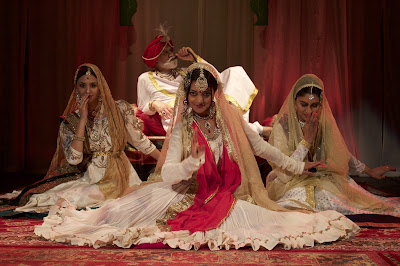The opulence and contradictions of the Indian culture revive in a fascinating tale of female pride and strive for independence.
Born in 1873, singer and dancer Gauhar Jaan gained widespread fame for her talent, as well as for her defiance of a male-dominated society. Her position of courtesan, likewise her European counterparts, gave her access to better education and a relative freedom of making her own choices, which, inevitably, clashed with the authoritarian attitude of her patrons. Feeling entitled by gender and status, these men would attempt to rule her artistic career, as well as more private aspects of her life.
Referred to as 'the Datia incident', one of these notable attempts is reimagined by playwright Tarun Jasani and relates to a biting altercation between 'the Queen of the Arts', played by Sheetal Kapoor, and the Maharaja Bhawani Singh Bahadur of the kingdom of Datia (Harmage Singh Kalirai). At the time of the incident, Gauhar Jaan had been invited into court to perform for an official celebration but would categorically refuse to submit to the direct requests of the monarch. Determined, as she was, to establish her right to self-determination.
A few years after this episode, in 1902, recording engineer Fred Gaisberg (Jordon Kemp) started travelling across India, on a mission to track down the famous singer and record her musical prowess with the help of a newly invented piece of machinery, called the gramophone. Along his journey, he met some people (all played by Jas Steven Singh), who offered him different versions of the famous 'Datia incident' and the events that led to Gauhar Jaan's unprecedented punishment.
Eventually, the gifted musician became India's first recording artist and some of her repertoire of classical pieces are still available to the public.
To better immerse the audience into the splendour and seclusion of the Maharaja's quarters, the performance is intertwined with sinuous routines, choreographed by Kuchipudi's virtuoso Arunima Kumar. The dancers look stunning with their slow-moving bodies covered in jewels and rich traditional dress, the lighting following them like an animated creature.
Portraying a woman that is seen by the men around her as "hard to tame", the
play opens up to a general feminist discussion about gender equality, and the low consideration that the Indian society reserved for its women. It would be interesting to make a comparison with the current state of affairs and the improvements that have been made in just over a hundred years.
To accompany this production, the Omnibus Theatre, is also hosting a very interesting exhibition supported by the EMI Group Archive Trust and The British Library. This can be seen in the venue's foyer and I highly recommend anyone to arrive early and take some time to learn more about this pioneering and extraordinary woman.
Review by Marianna Meloni
Rating: ★★★★
Seat: unreserved | Price of ticket: £15



